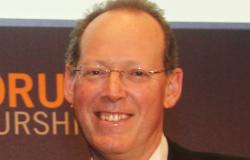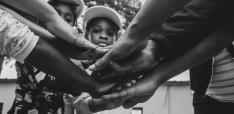On the Passing of Paul Farmer, a True Partner to the World’s Poor

Jonas Ecke reflects on the life and work of Paul Farmer.
Paul Farmer, a medical anthropologist and physician who served some of the world’s most vulnerable populations unexpectedly passed away on February 21. It is hard to overstate this loss to activists, scholars and practitioners in global health around the world, and, most importantly, to those he served.
He was many things to many people: to his patients, he was a caretaker who would take the time to acknowledge their humanity, struggles and history. To scholars, he was a peer who meticulously interrogated social realities and the historical record to illustrate the deep history of our neglect for the poor. To his students in the medical sciences, anthropology and beyond, he was a daily inspiration to become involved into the struggle for a more equitable world. To decisionmakers in government and international organizations, he was, by times, a friend, and at others a thorn in their side – but always reminding them to leverage serious resources to heal the ailments of the world’s most vulnerable. I never met him, but I heard from those who did, and they testified to his humility, which he maintained despite an unparalleled intellect.
Throughout his career, he stood by and practiced some key values that he interweaved into all of the work of himself and his organization, Partners in Health, which were drawn from liberation theory: One was accompaniment, the notion that we should stand side-by-side and accompany people afflicted by any disease, as well as the “preferential option for the poor” – which postulates that just as diseases, viruses and pathogens afflict the poor the most, so should cutting-edge, modern medicine.
Collectively, we fail short of the latter – as inequalities, and with it the burden of diseases, skyrocketed in the wake of Covid-19, we do not spend the resources to truly prevent and treat suffering around the world despite overall exponentially growing wealth. Drawing from his anthropological training, he extensively wrote and spoke about how nation-states are still stuck in a disease control rather than a healthcare paradigm when they formulate policies for their austerity-plagued healthcare systems. In his recent tome “Fevers, Feuds, and Diamonds: Ebola and the Ravages of History”, he illustrated how colonial powers prevented diseases so they could advance and consolidate markets, but never invested in genuine healthcare among those they dominated.
Paul argued that this path-dependency was never broken, which he saw epitomized in the barebone Ebola treatment units during the West Africa outbreak of 2014. In those facilities, patients received basic medical treatment but almost no caretaking. These places bear similarities to many of the other ones to which he brought his readers and followers, from underserved communities in Boston to Russian hospitals.
We are far away from being caretakers to those who need it to most, and even neglect disease control, as the funding shortages for the Global Fund on Aids, Tuberculosis and Malaria, which he helped establish, make apparent.
Any activism is riddled with the need to make compromises. I never heard him speak about where he decided to make specific tradeoffs, and he never talked much about this even around those close to him. Now we can never pick is mind on this and other topics. Paul entered many elite circles, and whenever he was given the stage, he always advanced a materialist, radical critique on current arrangements in global health, channeling the voices of his patients in places of power.
Personally, his work partly inspired me to pursue a PhD in anthropology and work in global health in the hope of shaping the world for the better, though I would never have the energy or versatility to do all he did. Few people do. In my life, his presence felt like the one of a friend – though I never met him. He always compelled us to remain optimistic despite the challenges presented by the dystopian world that the powerful have created. It will take thousands of us to fill the hole Paul left. Let’s get to work to do so immediately. There is no better way to honor Paul’s legacy.
Jonas Ecke is a global health practitioner. He has worked in the field of humanitarian aid in Ghana, Liberia and South Sudan. His work encompasses local perceptions of Ebola, malaria and Covid-19, and he publishes both in journalistic and academic outlets. He earned is PhD in anthropology from Purdue University in the US.


